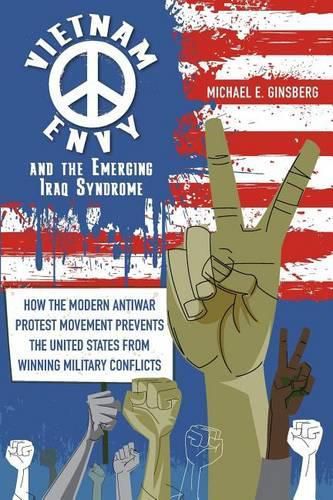Readings Newsletter
Become a Readings Member to make your shopping experience even easier.
Sign in or sign up for free!
You’re not far away from qualifying for FREE standard shipping within Australia
You’ve qualified for FREE standard shipping within Australia
The cart is loading…






During the Vietnam War, an influential antiwar movement developed that eroded the credibility of and support for the war, created a propaganda template for those who oppose any American military campaign, and affected the United States’ ability to project power for decades.
Vietnam Envy and the Emerging Iraq Syndrome is author Michael E. Ginsberg’s exploration of how the lingering Vietnam War protest dynamic undercut the United States’ ability to fight the Iraq War. The antiwar movement prevented policymakers from taking steps necessary to secure a lasting victory in Iraq and produced an emerging Iraq Syndrome-a post-Iraq reluctance by policymakers to credibly threaten and, if necessary, use force to protect American interests.
Ginsberg argues that a segment of Americans, from students and Sixties protestors to pop icons and journalists, are inclined to oppose any US military actions to recreate the antiwar culture of the Sixties and follow the Vietnam protest template.
Drawing from this thesis, Ginsberg identifies important parallels between the Vietnam protest movement and the Iraq War opposition. Ginsberg concludes America’s always-latent antiwar movement gravely threatens the United States’ ability to protect its interests but that policymakers can take steps to avoid this fate.
$9.00 standard shipping within Australia
FREE standard shipping within Australia for orders over $100.00
Express & International shipping calculated at checkout
During the Vietnam War, an influential antiwar movement developed that eroded the credibility of and support for the war, created a propaganda template for those who oppose any American military campaign, and affected the United States’ ability to project power for decades.
Vietnam Envy and the Emerging Iraq Syndrome is author Michael E. Ginsberg’s exploration of how the lingering Vietnam War protest dynamic undercut the United States’ ability to fight the Iraq War. The antiwar movement prevented policymakers from taking steps necessary to secure a lasting victory in Iraq and produced an emerging Iraq Syndrome-a post-Iraq reluctance by policymakers to credibly threaten and, if necessary, use force to protect American interests.
Ginsberg argues that a segment of Americans, from students and Sixties protestors to pop icons and journalists, are inclined to oppose any US military actions to recreate the antiwar culture of the Sixties and follow the Vietnam protest template.
Drawing from this thesis, Ginsberg identifies important parallels between the Vietnam protest movement and the Iraq War opposition. Ginsberg concludes America’s always-latent antiwar movement gravely threatens the United States’ ability to protect its interests but that policymakers can take steps to avoid this fate.